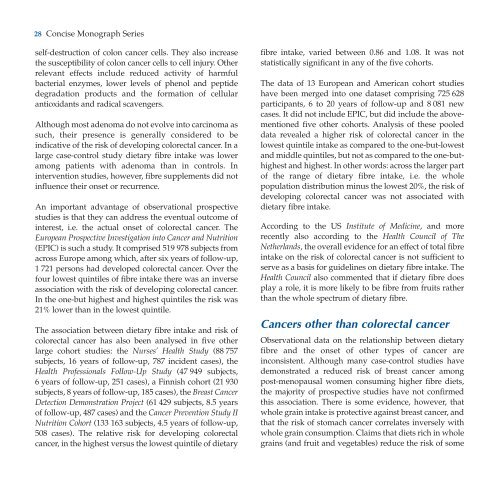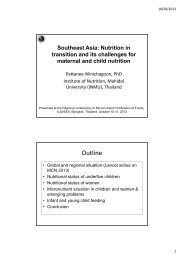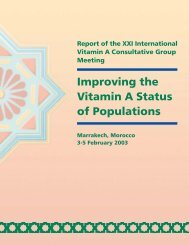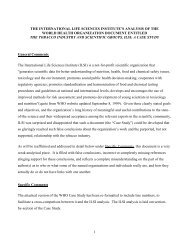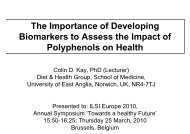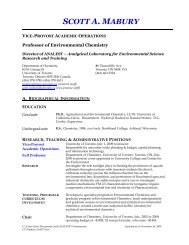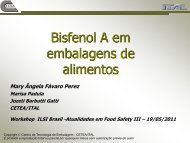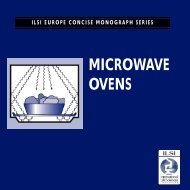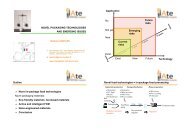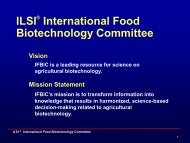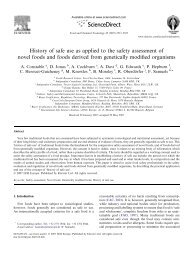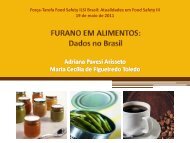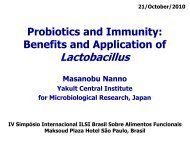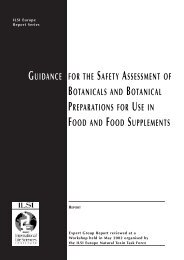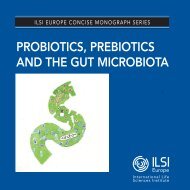Dietary Fibre - ILSI Argentina
Dietary Fibre - ILSI Argentina
Dietary Fibre - ILSI Argentina
Create successful ePaper yourself
Turn your PDF publications into a flip-book with our unique Google optimized e-Paper software.
28 Concise Monograph Series<br />
self-destruction of colon cancer cells. They also increase<br />
the susceptibility of colon cancer cells to cell injury. Other<br />
relevant effects include reduced activity of harmful<br />
bacterial enzymes, lower levels of phenol and peptide<br />
degradation products and the formation of cellular<br />
antioxidants and radical scavengers.<br />
Although most adenoma do not evolve into carcinoma as<br />
such, their presence is generally considered to be<br />
indicative of the risk of developing colorectal cancer. In a<br />
large case-control study dietary fibre intake was lower<br />
among patients with adenoma than in controls. In<br />
intervention studies, however, fibre supplements did not<br />
influence their onset or recurrence.<br />
An important advantage of observational prospective<br />
studies is that they can address the eventual outcome of<br />
interest, i.e. the actual onset of colorectal cancer. The<br />
European Prospective Investigation into Cancer and Nutrition<br />
(EPIC) is such a study. It comprised 519 978 subjects from<br />
across Europe among which, after six years of follow-up,<br />
1 721 persons had developed colorectal cancer. Over the<br />
four lowest quintiles of fibre intake there was an inverse<br />
association with the risk of developing colorectal cancer.<br />
In the one-but highest and highest quintiles the risk was<br />
21% lower than in the lowest quintile.<br />
The association between dietary fibre intake and risk of<br />
colorectal cancer has also been analysed in five other<br />
large cohort studies: the Nurses’ Health Study (88 757<br />
subjects, 16 years of follow-up, 787 incident cases), the<br />
Health Professionals Follow-Up Study (47 949 subjects,<br />
6 years of follow-up, 251 cases), a Finnish cohort (21 930<br />
subjects, 8 years of follow-up, 185 cases), the Breast Cancer<br />
Detection Demonstration Project (61 429 subjects, 8.5 years<br />
of follow-up, 487 cases) and the Cancer Prevention Study II<br />
Nutrition Cohort (133 163 subjects, 4.5 years of follow-up,<br />
508 cases). The relative risk for developing colorectal<br />
cancer, in the highest versus the lowest quintile of dietary<br />
fibre intake, varied between 0.86 and 1.08. It was not<br />
statistically significant in any of the five cohorts.<br />
The data of 13 European and American cohort studies<br />
have been merged into one dataset comprising 725 628<br />
participants, 6 to 20 years of follow-up and 8 081 new<br />
cases. It did not include EPIC, but did include the abovementioned<br />
five other cohorts. Analysis of these pooled<br />
data revealed a higher risk of colorectal cancer in the<br />
lowest quintile intake as compared to the one-but-lowest<br />
and middle quintiles, but not as compared to the one-buthighest<br />
and highest. In other words: across the larger part<br />
of the range of dietary fibre intake, i.e. the whole<br />
population distribution minus the lowest 20%, the risk of<br />
developing colorectal cancer was not associated with<br />
dietary fibre intake.<br />
According to the US Institute of Medicine, and more<br />
recently also according to the Health Council of The<br />
Netherlands, the overall evidence for an effect of total fibre<br />
intake on the risk of colorectal cancer is not sufficient to<br />
serve as a basis for guidelines on dietary fibre intake. The<br />
Health Council also commented that if dietary fibre does<br />
play a role, it is more likely to be fibre from fruits rather<br />
than the whole spectrum of dietary fibre.<br />
Cancers other than colorectal cancer<br />
Observational data on the relationship between dietary<br />
fibre and the onset of other types of cancer are<br />
inconsistent. Although many case-control studies have<br />
demonstrated a reduced risk of breast cancer among<br />
post-menopausal women consuming higher fibre diets,<br />
the majority of prospective studies have not confirmed<br />
this association. There is some evidence, however, that<br />
whole grain intake is protective against breast cancer, and<br />
that the risk of stomach cancer correlates inversely with<br />
whole grain consumption. Claims that diets rich in whole<br />
grains (and fruit and vegetables) reduce the risk of some


